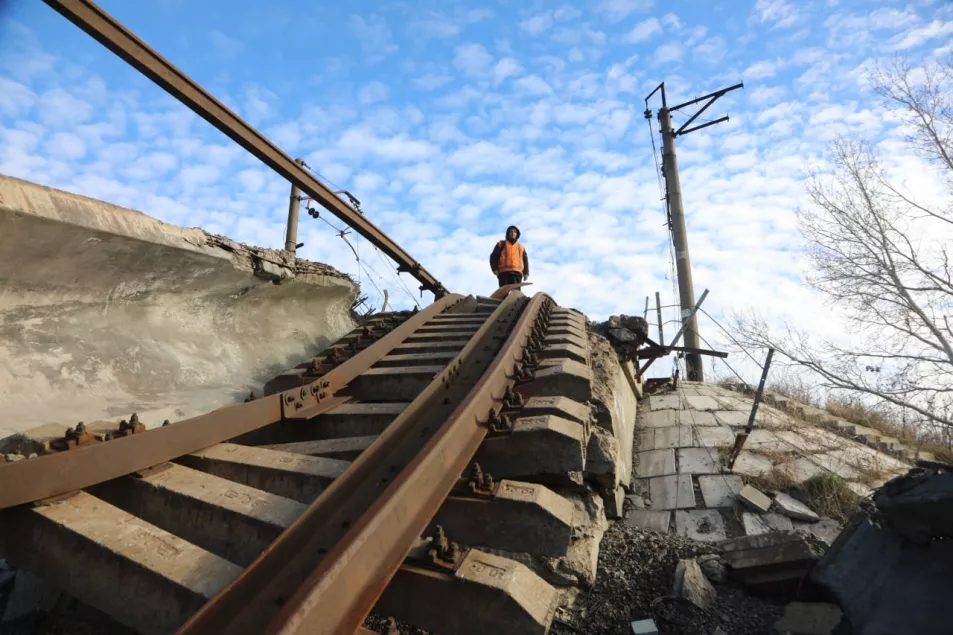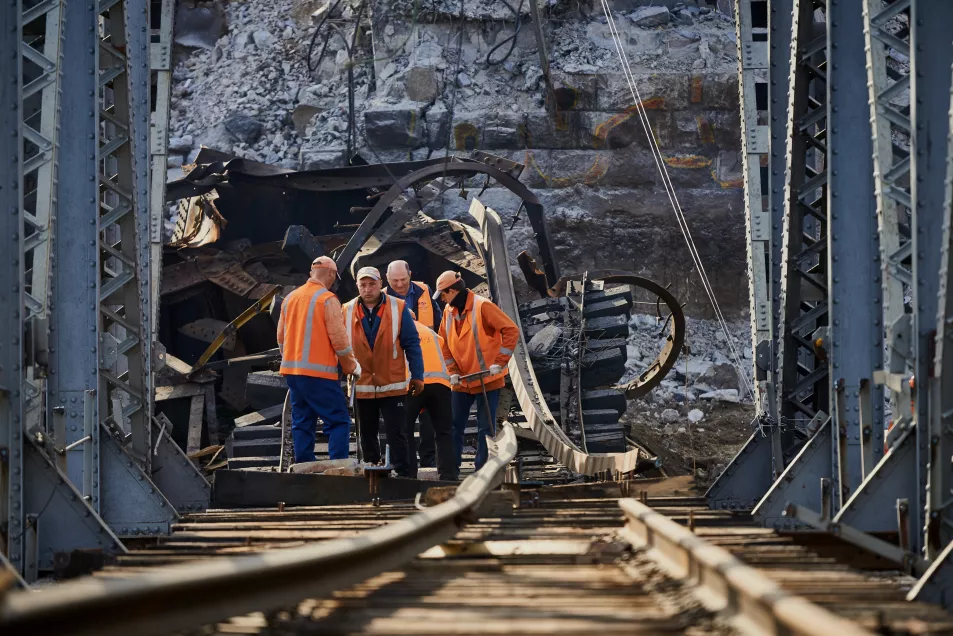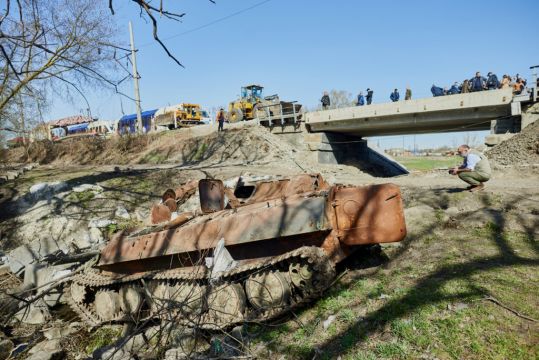A huge operation to help rebuild Ukrainian railways bombed by the Russian army will play a critical role in ensuring the country “wins the war”, the British transport secretary has said.
The UK Government has pledged £10 million worth of material and equipment to the war-torn nation to repair its ailing infrastructure.
Ukraine’s railways have been under almost constant attack by rockets and cruise missiles since Vladimir Putin invaded a year ago.
Despite being badly damaged, Ukraine’s vast network of tracks has remained a critical lifeline to the military effort, to maintaining its grain exports, and not least to the four million evacuees who have fled conflict zones using its routes.

However, repairing the network requires time and resources, and the dangerous work undertaken by the dedicated engineers of the state-owned railway, Ukrzaliznytsia, has cost lives – 307 people have so far been killed and 665 injured in less than a year of fighting.
It is hoped the aid package, which includes rapid-build modular steel bridges and tunnel lining repair equipment, will make the job of getting Ukraine’s railway up and running faster and safer, and help give them an edge against Putin’s troops.
The first aid shipment supplied by Network Rail, British engineering firm Mabey Bridge Limited and the Department for Transport, has already been delivered to Ukraine via Poland.
A number of Ukrainian engineers were invited to England in January to train on how to assemble the pre-engineered bridges before being flown home to train their own teams.

Speaking during a visit to Mabey Bridge HQ in Lydney, Gloucestershire, with the Ukrainian ambassador to the UK Vadym Prystaiko, Transport Secretary Mark Harper told the PA news agency: “This is a really important project where Mabey Bridge and Network Rail are working together to support the Ukrainian railway system which has come under attack from Putin’s illegal war in Ukraine.
“What we’re doing here is supplying both equipment and supplies, but also we’re training Ukrainian railway personnel who are then going to go back to Ukraine and train their teams of engineers on how to use this equipment to get their railway back up and running when it gets attacked by Putin’s troops.
“I’ve been able to speak to some of those Ukrainian personnel and it’s really clear the importance of this and that this is going to make a difference in helping to get their railway working again.”
Mr Harper said the effort would not only help reconnect the Ukrainian people but help with global supply chains of grain and keep food prices across the world down.

“But it’s also part of our bigger effort in making sure that the Ukrainians win this war against Russia,” Mr Harper added.
“It’s important to every single one of my constituents and every single person living in the UK that the Ukrainians win this conflict,” he said.
“If they don’t, Putin is not going to stop and we’ll see this sort of conflict spreading in Europe.
“It’s absolutely critical that he is defeated.”

Last year the UK provided £2.3bn in military aid to Ukraine – the largest package of support of any European nation and second only to the United States.
The government has also pledged £1.5bn in economic and humanitarian support.
People living in Britain have given refuge to more than 150,000 Ukrainians.
One of the Ukrainian engineers, who must remain anonymous for his own safety, said: “There’s no doubt that the support we’re getting from our British colleagues will assist us in rebuilding the railway and connecting our country.
“I would like to say thank you to both the British government and the ordinary British people who are supporting our country and helping it. Their support for our country is invaluable.

“But it is never too much help during war time so we are hoping that we will continue to get this support even more.”
Asked if he feared returning to Ukraine, the man said: “No. It is my motherland and we have to protect it and rebuild it.
“It is really dangerous now, but this is work that we have to do. This is our job and we are doing it because no one else apart from us can.”
Infrastructure in areas where fighting continues or those which have been newly liberated, such Kherson, is “either damaged or destroyed completely”, he revealed.

In under a year of fighting, 69 bridges and 36,942km of railway tracks have been destroyed, according to the Ukrainian railway authority Ukrzaliznytsia.
Speaking through an interpreter, the railway worker said he was from Dnipro – one of the city’s that has faced bombardment by Russian forces – but now works in Kyiv.
“I think all families are affected by the war,” he added.
“Lots of families were forced to separate and live in different towns and cities, and my family is pretty much the same.”

Michael Treacy, head of Mabey Bridge, which specialises in accelerated bridge construction in military settings, humanitarian emergencies and disaster relief, said a lack of transport links can have “a huge effect on people’s lives”.
“When people think of aid they might not automatically think of bridges, but getting people their transport systems back makes such a difference,” he said.
During their time at the company’s base the engineers were able to build one of the bridges destined for Ukraine in two-and-a-half days.
Mr Treacy said: “We think even to do the other works around it you’re talking a maximum of two weeks to have the bridge back in service on a railway that’s been broken or bombed.”

In comparison, he said a traditional bridge such as one made from concrete could take months or even years to build.
“That’s one of the real benefits to these bridges, because speed is of the essence here,” he said.
Network Rail chief executive Andrew Haines said Britain is “leading the way” in the effort to help rebuild Ukraine’s infrastructure.
“No other rail system in Europe is providing this level of support to Ukrainian railways,” he said.
“And because these bridges can last a couple of decades or more, it will also help with the reconstruction of Ukraine afterwards.
“I think it’s a brilliant way of being able to help quickly, relatively small scale, relatively low cost, but doing our bit to help a just cause in the face of unjust action.”







